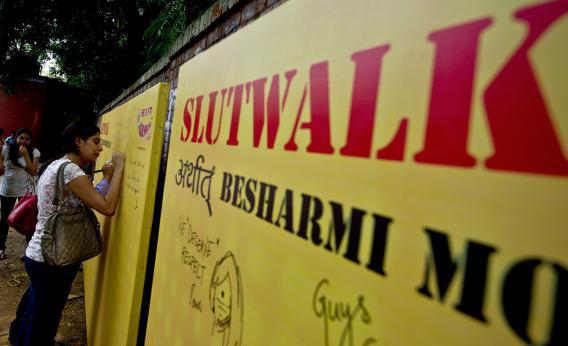As SlutWalks have picked up steam around the country I’ve not been surprised at the dearth of black participants. Although I’ve seen a sprinkling of black faces and other people of color in photographs of the rallies, I knew black women would not come out in full force. (They did come out in South Africa though, which was surprising but perhaps shouldn’t have been given that it was once considered the rape capital of the world. There were 55,000 rapes there between 2009 and 2010.) I and most of my black girlfriends would no more take part in “SlutWalks” than we would in Bitch Runs, Skank Strolls or as this writer noted in the Crunk Feminist Collective “a mass ho stroll.” Despite what hip-hop music would have people think, black women as a group do not embrace names that debase us. And that includes “slut.”
I understand and even support the goals of the SlutWalks, but for me trying to reclaim and reframe “slut” is just as fruitless as efforts to take back and tame the “N-word.” It’s never going to happen. Certain words, especially those loaded with a history of painful racial subjugation and sexual marginalization will always hurt when others, especially those outside your racial or gender group, hurl them at you. That’s why young black people, especially young men who freely throw the “N-word” around and even use it as a term of endearment for their homeboys, will turn around and senselessly take serious umbrage when white people use it. And that’s why so many black women took offense when they saw photos of a white woman at a Slutwalk in New York City holding up this sign that said “Woman Is the Nigger of the World.”
While the sign holder may have been well-intentioned, to my mind she was also buying into the notion of black people’s low social status. I guess to her mind being seen or treated as black is the ultimate putdown for a woman. What then, if you are an actual black woman? And equating sexism with racism is always risky when you consider that black women often have to contend with both issues and white women don’t. This point was eloquently made in this piece by a black self-described “rape survivor” who described the debate among feminist over “The idea that there is an inherent level of white privilege involved in Slutwalk….” She said the sign, “in many ways is the physical representation of the debate between white feminists and women of color who feel alienated by SlutWalk.”
In an open letter to the organizers of the New York City Slutwalk black women explained why they feel this way:
Black women in the U.S. have worked tirelessly since the 19th century colored women’s clubs to rid society of the sexist/racist vernacular of slut, jezebel, hottentot, mammy, mule, sapphire; to build our sense of selves and redefine what women who look like us represent. Although we vehemently support a woman’s right to wear whatever she wants anytime, anywhere, within the context of a “SlutWalk” we don’t have the privilege to walk through the streets of New York City, Detroit, D.C., Atlanta, Chicago, Miami, L.A. etc., either half-naked or fully clothed self-identifying as “sluts” and think that this will make women safer in our communities an hour later, a month later, or a year later. Moreover, we are careful not to set a precedent for our young girls by giving them the message that we can self-identify as “sluts” when we’re still working to annihilate the word “ho”, which deriving from the word “hooker” or “whore”, as in “Jezebel whore” was meant to dehumanize.
The personal is political. ………..We can learn from successful movements like the Civil Rights movement, from Women’s Suffrage, the Black Nationalist and Black Feminist movements that we can make change without resorting to the taking-back of words that were never ours to begin with, but in fact heaved upon us in a process of dehumanization and devaluation.
The organizers responded in kind:
We recognize that SlutWalks around the world have been critiqued from anti-racist standpoints since the first Walk. We agree with many of these critiques, and have attempted to engage with them in our organizing. We recognize that under the banner of SlutWalk, we put logistics over politics in many cases, and that this was a failing. But now as we are moving forward, we realize that we cannot cultivate an identity as a coalition without upholding all of the intersecting identities of our organizers and participants.
It is unfortunate that this young white woman’s voice has been amplified through media and all over the internet, and the voices of our intelligent, passionate speakers and MC’s, many of whom occupy marginalized identities, or are allies, continue to be ignored.
Despite these differences in perspective, no one can argue that marching to end violence against women is not a worthy goal. Both sides should keep talking. Even if black women won’t march under the official banner of SlutWalks, it doesn’t mean we can’t or don’t support the larger goal, or that we can’t take part in other anti-violence efforts under a different name.
